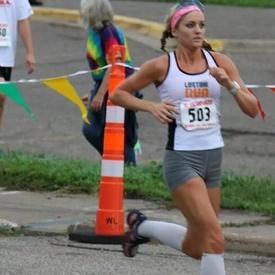Your number one piece of Marathon advice

ZenInTexas
Posts: 780 Member
I'm doing my first marathon in 2 weeks. I came off my last long training run feeling confident about going into the race but now my nerves are getting the best of me and I'm starting to psych myself out. So I want to really focus on getting my mental game on and my head straight. If you are a marathon veteran what's the best piece of advice you could give me? What do you focus on during the race to keep going when it gets tough? What do you wish you had known before you ran your first? Have a favorite mantra? Give me your best!! I'm hoping to compile some stuff I can maybe write on my arm on race day to look at when the going gets tough.
0
Replies
-
I wish someone would have told me not to take it so seriously. I wish someone would have shook me and told me not to have expectations. When people say your goal should be to finish, they are not joking. If you feel like you are dying at mile 23, remember it's totally normal & don't panic if you have to walk. Don't beat yourself over the fact that you may slow down significantly or walk. My best marathon experiences, I had to accept that I was slowing down, but I kept my thoughts POSITIVE & reminded myself it doesn't matter if I PR, I am running a franking marathon & ithat in itself is truly amazing! I get lost in the moment from 21-finish. My first marathon I stopped and cried because I felt like a failure for slowing from 8:45 to 10:00 pace... I let my thoughts take over. I said a lot of nasty things to myself. Every marathon since that first one, I've cried tears of joy around 22 because I realize what in doing is border-line magical lol
 just don't be negative!!! 0
just don't be negative!!! 0 -
The number one piece of advice?
SLOW DOWN! :laugh:
If you feel like you are going way too slow during the first 20 miles, then you are probably doing fine.
The goal for the first marathon should be to finish in one piece. It takes years to develop the fitness necessary to race a marathon.
The mantra that I have used for two marathons that weren't relatively flat was "Manage the effort, not the pace" to keep me from becoming fixated on what the Garmin is telling me. The marathon is ALL about fuel conservation. The idea is to run out of glycogen as you cross the finish line. If you go a little too fast, or expend too much effort to maintain your pace going up a hill, you could run out before the finish. This is "the wall". To avoid this, I tried to concentrate on maintaining a consistent level of effort through the elevation changes.0 -
in for the wisdom0
-
OK... I'll leave it to @arc918 to swoop in with his top three tips, but will give you a hint: they all involve not going out too fast!!! Develop a pace plan that gradually picks up the pace throughout the race... which means starting out SLOW. I'd also say don't be afraid to take on calories/carbs in whatever form you've trained; gels, chews, etc. I'd rather take on the carbs early and often than hit the wall.
As far as mantras go, I have two: "Float, flutter, fly" (from an episode of The Backyardigans... so that one makes me giggle while it keeps me light on my feet!). The other is "Strong, smart, fast" - the smart is all about holding waaaaaayyy back early in the race so that I can taunt people as I pass them in the last 6 miles!
Finally, my biggest mental tip (particularly since you feel good about your long runs) is to remind yourself how many times you've done this. How many times have you run a half?!? A bunch. So crank through the first half marathon (slowly!) and then all you've got is another half marathon left. Then, when you hit mile 18, all you've got left is 8 miles. And how many times have you run 8 miles?!? A million, I bet it seems like! And when you hit mile 20 - pfffft - all you've got is a measly 10K! You could crank through a 10K in your sleep. At mile 23 - OMG - you've only got a 5K left!!! That's a joke!
You've trained, you've run a million miles... the hay is in the barn. It'll be there for you when you need it on race day. Best of luck to you!!! :flowerforyou:0 -
The number one piece of advice?
SLOW DOWN! :laugh:
^This.
I've only run one and I started out way too fast. I ended up crashing and burning. The last 5 or 6 miles were agony. I wanted to give up running forever. I felt like a failure at the end. It was several weeks before I felt like I had accomplished something by finishing, which should have been my goal from the beginning. I ran my first ultra a year later. My goal was just to finish and I felt positive the whole time and great at the finish (well, as great as could be expected).
I would get a good estimate for what pace you could do and then make sure you start slower than that.0 -
Totally with Carson. The first 10 miles or so should feel ridiculously easy. Keep the pace controlled. When it gets tough break it into little pieces. "After this mile I'll take a break". And then after that mile, "ok, till I catch that guy in front". Have as much fun as you can. Giving high fives to people along the course helps me0
-
These are great!!!0
-
Don't try anything new on race day.
Keep doing what you have been doing in training. Don't make any major adjustments on race day:
1. Hydrate like you always have, not more or less
2. Don't use the race provided energy gels, etc unless you have trained with those same gels before the race
3. No last minute shoe changes0 -
Finally, my biggest mental tip (particularly since you feel good about your long runs) is to remind yourself how many times you've done this. How many times have you run a half?!? A bunch. So crank through the first half marathon (slowly!) and then all you've got is another half marathon left. Then, when you hit mile 18, all you've got left is 8 miles. And how many times have you run 8 miles?!? A million, I bet it seems like! And when you hit mile 20 - pfffft - all you've got is a measly 10K! You could crank through a 10K in your sleep. At mile 23 - OMG - you've only got a 5K left!!! That's a joke!
I love this! I was totally making these mental calculations during my first (and only so far) marathon!
I also love all the advice above people made regarding pacing0 -
Don't eat anything different than you normally eat before on a long run.
I learned the hard way 0
0 -
For future reference.0
-
I would just reiterate the two things said before:
1.) Don't do anything different on race day. (I was told, before my marathon, that you run so far your feet swell and it becomes really uncomfortable. So, I loosened my shoes, to give my feet room. I ended up getting blisters, which really slowed me down.)
2.) Do not start out too fast. This is so easy to do, what with the adrenaline of the race and all kinds of other, faster people around you at the start.
Good luck and have fun!0 -
Slow, slow, slow. And keep in mind anything that is "abnormal" will be magnified on race day (aches, weather, fueling). I felt fine on mine, but the heat got to me in the last 9 miles, and it wore me down to a stump.0
-
For every long race that I do (and I have done many that are pretty damn long), I always carry what I call my magic pill, just in case I need it. I learned this during my first marathon, where a woman handed me a Life Saver candy at about mile 20. That Life Saver got me through the end of the race. These days my magic pills are usually the Ginger People ginger chews. I know it's there in my pack, easily accessible, and I know that I can get it if I need it. I'd say that these days I end up eating it about 20% of the time. But just knowing that it's there (and I love ginger chews!) helps for some reason.
I don't really have a motivational mantra. What I usually end up doing is saying either out loud or in my head, "Shut up, governor!" (as in this governor: http://www.irunfar.com/2013/06/peak-performance-and-the-selfish-brain-the-central-governor-and-its-role-in-100-mile-performance.html) And sometimes I say, out loud or to myself, "Just keep swimming, just keep swimming, just keep swimming." :happy:0 -
+1 to starting off slow. Someone said it best, think of it as an investment. The real race starts at Mile 20! In a race as long as a marathon, every second and every move counts. So if you bolt out even 15 seconds faster than your intended race pace, that could wreak havoc in the later miles. All of a sudden your later miles will be 30 seconds to even a minute slower than your planned pace.
It's gonna be soooo easy to get caught up in the excitement and adrenaline of the first few miles. You're going to feel good, feed off of people, feel that energy, but you have to save it!
I think the worst thing anyone could do is ego-trip. For anyone who is super competitive, it might be hard to just let people pass you in the beginning. But, come mile 20 on, you'll be passing those same people if you run a smart race.
I wish I knew all this when I did my first. I always got caught up in the excitement of it all and just didn't stick to a strategy. Some people can just wing it, but most can't. It's true that one truly has to respect the distance for what it is.
Most importantly, have fun! When the going gets tough, tell yourself, "I didn't train xx amount of months just to quit now. I'm going to rock this b*tch!"
And you are going to rock it!0 -
Having only done one, my advice doesn't carry as much weight as others, but the whole slow thing was spot on for me. In my instance, I was still dealing with the aftermath of bronchitis. While this sucked, I think it actually helped force me to slow down, especially early. As I settled into a groove for the first half, my lungs cleared out a bit, I was able to take the last half ~12 minutes faster, and negative split the last 8 miles, while others were blowing up/slamming the wall/bonking.
As others have said, the first 10-13 miles should feel like you're going slow. After that, perhaps try to pick it up just a bit based on how you feel. If you've paced yourself correctly, you hopefully will still feel strong as you hit ~18+ miles and you start seeing the human wreckage of others hitting the wall. After you pass 20-22 (your previous max. long run), you should hopefully feel confident that you've got the last handful of miles.
You've got this Jen. Enjoy the experience.0 -
Don't eat anything different than you normally eat before on a long run.
I learned the hard way
True that!
Um, if your usual long runs happen AFTER your morning poop, wake up insanely early on race day to have that cup of coffee and special time with your smartphone.0 -
Fuel how you fueled in training even if you dont feel you need it at that point. Talk yourself up. I never feel like i've hitten "the wall" but around mile 22 it starts getting a bit mentally draining. I just remind myself it's only 4 miles left. IMO once you hit a certain point you pretty much know whatever happens you can knock out those last few miles even if you had to walk them all.0
-
This is what hitting the wall looks like on a Garmin.
Split Time
1 06:04.2
2 06:12.1
3 06:06.5
4 05:58.5
5 06:01.9
6 06:20.0
7 06:09.3
8 06:21.7
9 06:15.9
10 06:17.1
11 06:20.3
12 06:17.0
13 06:21.4
14 06:17.4
15 06:25.6
16 06:22.0
17 06:41.8
18 06:28.9
19 06:35.9
20 06:53.5
21 06:48.8
22 07:21.1
23 06:39.3
24 07:41.7
25 07:32.7
26 07:44.7
27 02:03.00 -
This is what hitting the wall looks like on a Garmin.
Split Time
1 06:04.2
2 06:12.1
3 06:06.5
4 05:58.5
5 06:01.9
6 06:20.0
7 06:09.3
8 06:21.7
9 06:15.9
10 06:17.1
11 06:20.3
12 06:17.0
13 06:21.4
14 06:17.4
15 06:25.6
16 06:22.0
17 06:41.8
18 06:28.9
19 06:35.9
20 06:53.5
21 06:48.8
22 07:21.1
23 06:39.3
24 07:41.7
25 07:32.7
26 07:44.7
27 02:03.0
I'd bet a dollar to a doughnut that the bolded splits are primarily responsible for the bonk.0 -
If your race has a pace group close to the time you want to finish stick with them. Most pacers are experienced and will help you meet your goal. Depending on the size of the race you could have a dozen people in the pace group which allows you to chat, discuss your training, and any one of thousand other things that don't involve how much mile 22 sucks. If your race doesn't have pacers set a speed limit for yourself and don't break it (see post directly above for the penalties for speeding)0
-
My biggest issue is always about fuel... during training I was just fine with the 20 miler, but when it came to race day, the fueling that worked for the 20 miler didn't work for me for the full. I should have consumed more and I should have consumed sooner than I did.
There is no shame in walking if you need it. Walking can breathe new life into tired legs; can reset a bad attitude.
Even if you're feeling like crap, smile. Sounds silly, but it can really work improve your outlook. Encourage your fellow runners - a little bit of encouragement might mean the world to them and I don't know about you, but helping other people always adds a little spring to my step.
Other than that, the most helpful thing for me is to break it into smaller distances. A marathon is really only a little farther than 5 5-mile runs. 5 mile runs are easy, right? I'm constantly doing mental math and breaking distances down like that ~ for whatever reason, it helps me a ton.
You will do GREAT. I just know it.
As an aside - during my first marathon, even when I felt the lousiest, I never doubted my ability to finish. And, since finishing was really my only goal, I was pretty happy throughout. During my third marathon when I was battling some painful hamstring issues, I nearly quit at the half way mark. One of the big reasons I didn't was because I'd bought a $1 poster before the race. That $1 made a huge difference because I couldn't have the ONE race poster that I had be for the race I didn't finish! Ha!0 -
This is what hitting the wall looks like on a Garmin.
Split Time
1 06:04.2
2 06:12.1
3 06:06.5
4 05:58.5
5 06:01.9
6 06:20.0
7 06:09.3
8 06:21.7
9 06:15.9
10 06:17.1
11 06:20.3
12 06:17.0
13 06:21.4
14 06:17.4
15 06:25.6
16 06:22.0
17 06:41.8
18 06:28.9
19 06:35.9
20 06:53.5
21 06:48.8
22 07:21.1
23 06:39.3
24 07:41.7
25 07:32.7
26 07:44.7
27 02:03.0
I'd bet a dollar to a doughnut that the bolded splits are primarily responsible for the bonk.
You'd probably come out on the right side of that bet. Plus, the last 5-6 miles were mostly incline, which certainly didn't help. I'm taking another stab at the same race (minimal course changes) on Saturday. Hoping to run a little smarter / faster.0 -
Great post! I was actually thinking about posting something similar (1 week to go until my first!).
Question - how do I know what a good pace to start out at is? Because I've been doing all of my long runs at just under an 11 minute/mile pace (around 10:50 to be exact), but everyone says you run faster on race day. So should I start out at the same 11 minute pace? Or go for 10:30?
Ideally I'd like to run the marathon at around 4:30 (which would be 10:18 pace). However, I am also telling myself it's okay if I'm closer to 5 hours! It is my first after all.0 -
Ideally I'd like to run the marathon at around 4:30 (which would be 10:18 pace). However, I am also telling myself it's okay if I'm closer to 5 hours! It is my first after all.
If that were my goal I would try and keep my mile splits between 10:00 and 10:30. It is tough to hold *exactly 10:18* for 26 miles; you may want to err on the side of caution and stay closer to that 10:30 time and then try and pick it up for the last 10K.0 -
You'd probably come out on the right side of that bet. Plus, the last 5-6 miles were mostly incline, which certainly didn't help. I'm taking another stab at the same race (minimal course changes) on Saturday. Hoping to run a little smarter / faster.
Is there a wrong side to a bet of a dollar to a doughnut? 0
0 -
While this doesn't really qualify as "advice", I just want to say that the marathon itself was far easier than the training for me. Maybe I didn't run the fastest time, but I really enjoyed myself because I focused on finishing rather than worrying about my time and most importantly, I also concentrated on soaking in the whole experience. Ok, I was beat to death when it was over, but I honestly can say that I enjoyed every second of the race.0
-
I have two pieces of advice:
1- Unless you are trying to qualify for a world record, and are going over 13 minute miles, don't worry about the time that you finish in. I know for me that if I can focus on how I feel instead of what the clock on your wrist says. If you have a mile that takes 9 minutes, and the next mile takes 11, who cares- no one. You're out there, you've trained, and you've done enough. Don't let it get into your head.
2- Speaking of your head. YOU WILL HIT A WALL. It may be at mile 7, it may be at mile 13, it may be at mile 20, it may be at all of the above. You will get over it. Everyone out on that course with you will hit that wall- so you'd be weird if you didn't. Have something ready to get yourself through. Think of the hugs from your four kids, think of all the chocolate you can eat at the end, think of the bragging rights or whatever it is that will get you through and keep going.0 -
all great stuff! bookmarking for May0
-
2- Speaking of your head. YOU WILL HIT A WALL. It may be at mile 7, it may be at mile 13, it may be at mile 20, it may be at all of the above. You will get over it. Everyone out on that course with you will hit that wall- so you'd be weird if you didn't. Have something ready to get yourself through. Think of the hugs from your four kids, think of all the chocolate you can eat at the end, think of the bragging rights or whatever it is that will get you through and keep going.
With this, I don't agree, unless you and I are defining "The Wall"differently. Hitting the wall occurs when the body runs out of glycogen. This doesn't happen to everyone, it depends on their fitness and how well they execute their plan. I've run 4 marathons now and I hit the wall in the first one and came really close in the 4th one. The middle two, no wall, no way.0
This discussion has been closed.






















